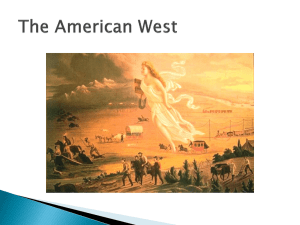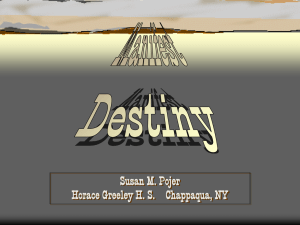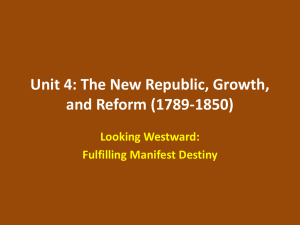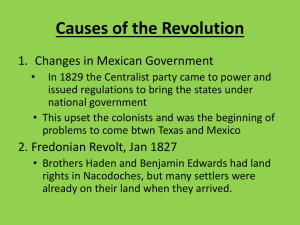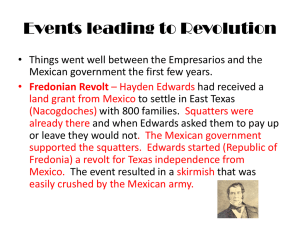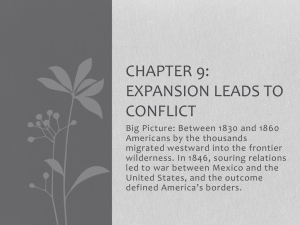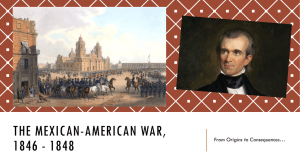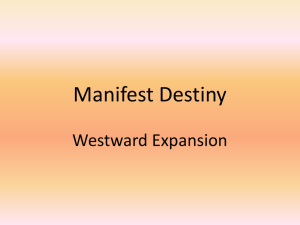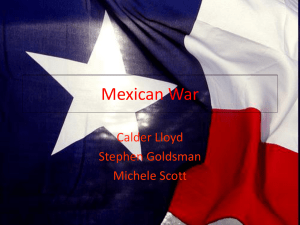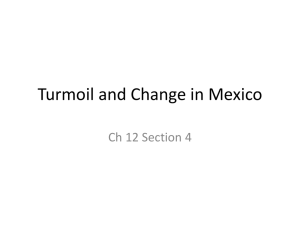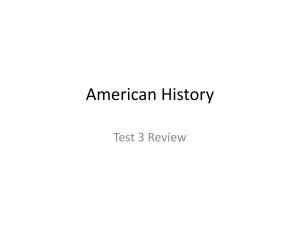Chapter 13 PP Notes 2014
advertisement
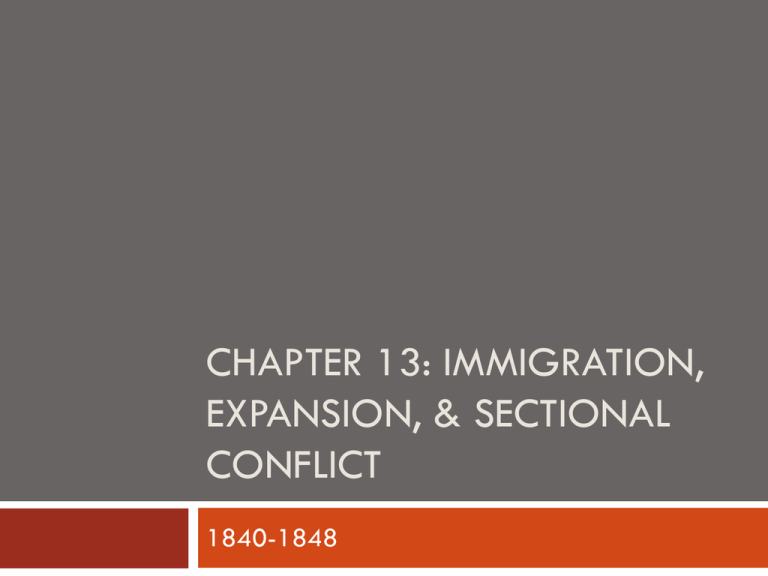
CHAPTER 13: IMMIGRATION, EXPANSION, & SECTIONAL CONFLICT 1840-1848 Section 1 Focus Question: How did immigration in the 1840’s influence the balance of power between the Whig & Democratic parties Big Picture: Texas independence Immigration & territorial gain = political change Expectations & Motivations Desire for religious freedom & better economic conditions. Unsafe boat rides, fake tickets, goal to find close knit groups. Arrival: NE & South Irish—no $ for farms & worked in urban NE. Germans—Spread from N.O. up Miss. River Cities demanded & welcomed immigrant labor Germans 1860—Germany contained diverse groups, religions, & origins. Farmers & professionals. Levi Strauss Language connector German-American Communities: own schools, companies, doctors… Did not go outside their communities. Struggled to gain political positions. Irish 1815-1820—mostly Protestant & small land owners Mid-1840’s—poor & Catholic 1815-1845—800,000 immigrated to the US “Great Famine” Worked in construction, textiles, & servants Nativists & Policy Anti-Catholic Protestants = Nativists Feared job loss George Henry Evans— National Reform Association Tried to gain land for newcomers Unions organized to attract workers Commonwealth v Hunt 1842—allowed Unions Mass.—fired union workers Democrats German & Irish support due to focus on jobs Tried to push expansion & banking/tariffs to group “Forty-Eighters” Whigs Turned off immigrant support Supported Abolitionism (job competition) Supported Moral behavior (temperance & education). Thought G/I were spreading bad behavior to public. Section 2 Focus Question: What economic and political forces fed westward expansion during the 1840’s? Big Picture: “West”—land W. of the Appalachians & Miss. River. Land & Trade LAND Transcontinental Treaty or Adams Onis Treaty (1819)—Parts of “Oregon” territory split between US & BR. 1820—Mexico gains independence & takes TX & NM Mexico territory undisputed. Land & Trade TRADE Merchants sailed around S. America to trade with California. “Californios” Catholic & Spanish Trails & trade links: St. Louis, MO to Santa Fe, NM Silver Peso Beaver pelts Conflict with Mexico Stephen Austin owned land in Texas, passed down from his father He led a group of 300 Americans to Texas to start a small colony Americans were told they could stay IF they agreed to become Mexican citizens and worship in the Roman Catholic Church Growing Conflict Thousands more flooded into Texas Disregarded Mexican law Brought slaves and were Protestants 1830 Mexico banned further U.S. settlement and tried to enforce its laws Began to levy heavy taxes on U.S. imports Declaring Independence In Mexico there was a movement for a more democratic government 1833 General Antonio Lopez de Santa Anna took control of government Over turned constitution and began a dictatorship (one person rule) 1836, under urging of Austin, Texans declared independence from Mexico What Did Mexicans Want? What did the Americans want? Texans at war Santa Anna attacked the Alamo, a mission where Texans and Mexican Texans (Tejanos) were gathered The Texans and Tejanos held out for 12 days under heavy cannon fire before Mexican forces overran it Results of the Alamo All the defenders killed in battle or executed afterwards Inspired by their bravery, many American volunteers joined the Texan Army Later Sam Houston, commander of the Texan Army led a surprise attack on Santa Anna at San Jacinto Captured Santa Anna and forced him to recognize Texan independence Beginnings of the Mexican-American War Polk offered Mexican government cash to settle the border dispute, purchase California and the rest of New Mexico This angered Mexico and they refused Polk then tried to provoke the Mexicans Sent General Zachary Taylor into the disputed land Mexicans ambushed them and Polk asked Congress for a declaration of war Settlement & Trails to the West By 1840—small groups settled in CA, NM, & OR. Overland Trails 4 month trip Supplies: guns, but shot themselves by accident Traveled in groups: starvation, hypothermia… “Donner Party” 1840: 11,500 immigrated & only 2,000 made it “Californios” issues… Trails Westward The Doomed Donner Party April, 1846 – April, 1847 The Doomed Donner Party CANNIBALISM !! Margaret Breen James Reed & Wife Patrick Breen John Breen Of the 83 members of the Donner Party, only 45 survived to get to California! Section 3 Focus Question How did westward expansion threaten war with Britain & Mexico? Big Picture: Annex Texas? CA? NM? OR? Economic Recovery Whigs 1840—William Henry Harrison Goal to stimulate economy Revise tariffs for internal improvements Dies = John Tyler VP Secret Democrat Vetoes Whig programs like Compromise 1833 to lower tariffs Raises tariffs to give to North (sim to Jackson Whigs 1842—Webster Ashburton Treaty Settled disputes between Maine & Canada Tyler thought support would lead to support for annexing TX Northern conspiracy Great Britain “Manifest Destiny” First coined by newspaper editor, John O’Sullivan in 1845. ".... the right of our manifest destiny to over spread and to possess the whole of the continent which Providence has given us for the development of the great experiment of liberty and federal development of selfgovernment entrusted to us. It is right such as that of the tree to the space of air and the earth suitable for the full expansion of its principle and destiny of growth." A myth of the West as a land of romance and adventure emerged. “American Progress” by John Gast, 1872 Manifest Destiny 1849 John O’Sullivan “Manifest Destiny” or “Sea to Shining Sea” Justification by “God” Spread “influences” Democracy, Democratic Expansionists “New Party” Supported religion, slavery by Irish & Anti-slavery advocates Over expansion = ungovernable empire Annexing Texas and Oregon Election of 1844 Election was between Henry Clay (Whig) and James K. Polk Polk won by promising to annex Texas and Oregon Tensions with Mexico Mexico had never formally recognized Texan independence Treaty Santa Anna signed set boundary at Rio Grande Mexican government claimed boundary was further north Annexation Before Polk took office President Tyler called for admission of Texas as state As President, Polk negotiated a treaty with Britain to divide Oregon (Now states of Washington, Oregon, and parts of Idaho) (49th Parallel) Section 4 Focus Question: How did the outcome of the Mexican-American War intensify intersectional conflicts? Big Picture: Gaining CA & NM = slavery issues! The Mexican American War War with Mexico popular with most Americans Support was strongest among Westerners and Southerners who wanted more land http://www.pbs.org/kera/usmexicanwar/timeline _flash.html Why would Westerners want more land? Why would Southerners want more land? How would the belief in “Manifest Destiny” make people support the war? Many Northerners argued that Polk had provoked the war How had Polk “provoked” the war? Rebellion in California Polk ordered troop under the command of Stephen Kearny to invade and capture Santa Fe, New Mexico Settlers near San Francisco had begun their own revolt against Mexico They raised a grizzly bear flag and declared California an independent republic John C. Fremont took control of the “Bear Flag Rebellion” Quickly captured major cities of California (Monterey and San Francisco) He then moved on to join forces with U.S. troops under the command of Kearny Kearny’s troops captured Santa Fe and San Diego United with naval units to occupy all of southern California Invasion of Mexico General Zachary Taylor and General Winfield Scott swept through Mexico with stunning victories even though they were often outnumbered How do you think they still won? Scott’s campaign ended at Chapultepec, a stone palace above the capital of Mexico City The Mexican troops fought bravely to defend Chapultepec, but most were killed How is this similar to the American experience at the Alamo? After Americans won the capital city, Santa Anna fled The U.S. had won the war Achieving Manifest Destiny The war ended with the signing of the Treaty of Guadalupe Hidalgo Under the treaty, Mexico recognized the annexation of Texas and gave the U.S. large amounts of territory Mexican Cession included present day California, Nevada, Utah and parts of Wyoming, Colorado, Arizona, and New Mexico U.S. also paid $15 million for this land In the Gadsden Purchase of 1853, U.S. paid Mexico $10 million for a narrow strip of present day Arizona and New Mexico The Mexican Cession How did Each Person Help bring Mexican land under u.s. control? A. General Kearny B. General Zachary Taylor C. General Winfield Scott D. John Fremont E. President Tyler F. President Polk G. Stephen Austin H. Sam Houston
